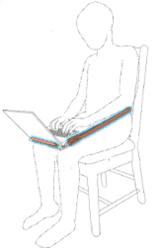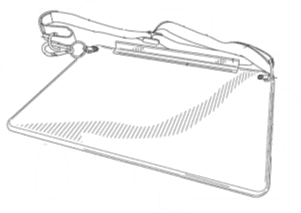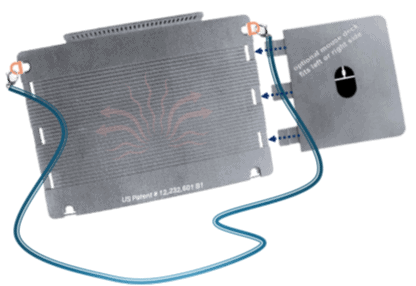SIOP Member Marc Fogel has attended more than 20 SIOP Annual Conferences, mostly to keep up with the latest developments in I-O psychology. But notetaking at the conference has always been a challenge.
“I have three hurdles that make it somewhat difficult for me to take quality notes,” he said. “First, I have ADHD, which makes it challenging to simultaneously take notes and pay attention to spoken content in sessions. Second, my handwriting is basically illegible—even to me! And third, since I take notes on my laptop, doing so while sitting on a chair with no table available (think: most SIOP conference sessions) is physically awkward and uncomfortable, not to mention hazardous to the laptop if someone brushes by when I’m not looking.”
And so, leaning into his I-O psychology background, Fogel set out to develop a solution to his problem—a lap desk that easily fits in his backpack, stays securely on his lap, is somewhat discreet.
“I see I-O as a problem-solving profession,” he said. “Whether it be solving problems regarding how to hire the best candidates, how to design and support the best teams, how to best develop leaders, or just about any other I-O topic. We are trained to see the gaps in organizational practices and to use our knowledge and tools to help close such gaps.
“In fact, I recently dug up class notes from my Personnel Psychology class (taught by my thesis advisor and SIOP [Retired] Member Dr. John Hazer), providing these problem-solving guidelines:
- Identify the problem
- Collect data about the problem
- Brainstorm solutions to the problem
- Evaluate potential solutions
- Implement best solution
- Follow-up to make sure problem is solved.
“I first identified the problem (struggling to balance my laptop on my lap while sitting in a conference chair). Next, while there was no traditional data to collect, I attempted to better understand the problem by breaking it down to its components, thus identifying the three criteria that would define the problem to be solved. That is, the solution needed to: (1) keep the laptop securely on my lap, (2) easily fit in my backpack, and (3) be discreet, so that I don’t stand out like a sore thumb.
“Next, I needed to brainstorm solutions. I began by searching online for a product that fit my requirements. I was both surprised and disappointed to find that no such product existed on the market. I knew it was a fairly simple problem to be solved, so decided to see if I could come up with my own solution.”
Fogel said the concept was simple: the laptop needed to sit on a thin, flat surface that would rest on the user’s lap. The device needed to have a backstop to prevent the laptop from sliding away and off the flat surface. And the flat surface needed to somehow be connected to the user so that it didn’t fall off their lap. The easiest solution for this last problem seemed to be a thin strap, wrapped around the user’s lower back and connecting to the front of the flat surface (see Figures 1 & 2.)
“I evaluated the solution by trying it out, and lo and behold, it worked like a charm,” he said. “I then implemented the solution at the 2024 SIOP Annual Conference, after which, the idea for a product was born.”
This is the second invention Fogel has come up with. When he was in grad school in the late 1990s, he created a contraption to secure his laptop above his treadmill such that he could read and type while working out. Being a newly married grad student, he did not pursue a patent, and later found out that a patent for a similar item had already been granted in 1993, even though it was not yet brought to market at the time. However, he does have a patent for his latest invention.
Fogel said that the notetaking method that has worked best for him in the past is to have access to presentations in advance. He inserts a copy into Microsoft OneNote and can then follow along with the presentation.
“I tend to use the tool’s built-in functionality for commenting and/or tagging points as ‘Ah-ha Moment,’ ‘Important,’ ‘Take Action,’ and other tags that help personalize my learning and document the content for later reference. This method has enabled me to have maximum engagement with the content in the moment, as well as the ability to go back later and review key learning points,” Fogel said. “This is why I love that SIOP now enables presenters to upload presentations to the Whova app! Speaking of which, I would like to take this opportunity to request that presenters remember to upload their session documents. Doing so is a huge help for me and, I’m assuming, for many others as well.”
Although human factors and ergonomics are not Fogel’s primary areas of I-O psychology interest, he prefers AI, coaching, teams, and talent, he believes this project has made him think differently.
“The proverb ‘Necessity is the mother of invention’ has come into clear focus for me over the past year,” he said. “An even more pertinent phrase I’ve recently heard is that ‘Innovation is frustration, monetized.’ For myself, years of frustration trying to comfortably use my laptop during SIOP sessions resulted in my taking action to eliminate my personal frustration. My next step is, hopefully, to monetize this frustration.”
Figure 3 shows Fogel’s first professionally made prototype, which he is hoping to have available for interested SIOP goers before next year’s conference in New Orleans.
The SIOP Annual Conference may have a small role in Fogel’s invention, but it has a big role in his profession.
“As I tell my non I-O colleagues, SIOP’s annual conference is where I go to replenish my I-O-style thinking, to challenge my assumptions, and to be around people who don’t look at me as if I just landed my spaceship when I get excited about a strong correlation coefficient,” he said. “While I absolutely enjoy catching up with old colleagues at the conference, my primary goal is to attend the most pertinent sessions that will help ensure I’m always up to date on key relevant advances in our field. To that end, I find attending panel discussions, debates, and other sessions that allow for presenters to interact and respond to each other’s points to be especially insightful.”
Fogel’s father was a clinical psychologist, so he was exposed to psychology at a young age. He recalls being fascinated by their conversations about thought processes, emotions, cognitive abilities, psychological disorders, and other psychological concepts. When he entered college at age 24 as a nontraditional student, he already had several years of work experience under his belt and said that those professional experiences, particularly working in team environments, expanded his understanding of psychology.
“I began to see that psychology isn’t limited to what happens within each person, but it also plays out between people, especially when they need to work together to accomplish goals,” he said. “I first encountered the term ‘organizational psychology’ in my Psych 101 class, and it immediately clicked. It was my ah-ha moment! That’s when I knew what I wanted to pursue as my career.”
Fogel currently serves as the director of Product, I-O Psychology at Talent Select AI. Over the past few years, he has worked closely with SIOP Fellow Dr. Michael A. Campion (The Herman C. Krannert Distinguished Professor of Management, Purdue University) and SIOP Member Dr. Emily D. Campion (assistant professor of Management, Tippie College of Business, University of Iowa) to develop and validate a new assessment tool powered by natural language processing. Their noninvasive solution analyzes candidates’ own language, whether from job interviews, resumes, and/or other unstructured written application materials, to assess a range of competencies, personality, and motivational traits.
“I’m excited to continue collaborating with Drs. Mike and Emily Campion to continue developing and delivering our unique selection assessment to our customers,” he said.
Figure 1

Figure 2

Figure 3

Post Type
Source
Topic
2025 Annual Conference

